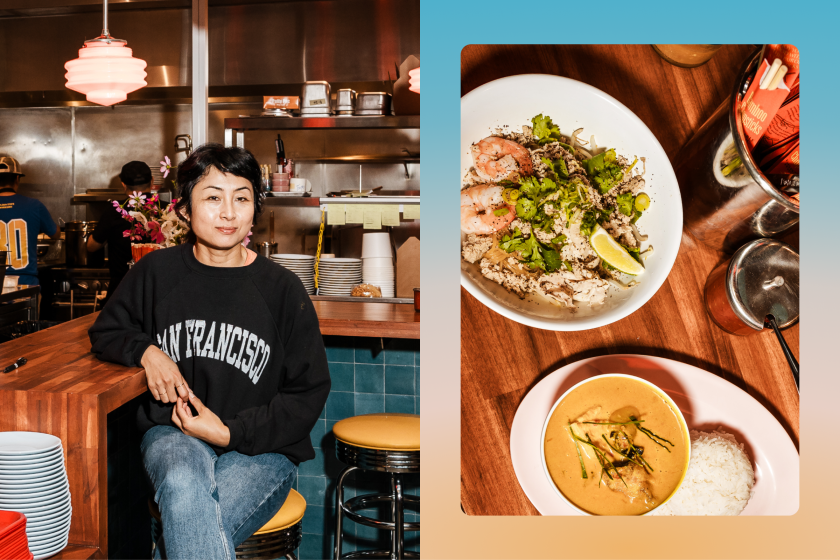No Rest on Sundaes for Franchisees : Ice Cream School Is More Sweat Than Sweets
Here’s the scoop: If you want to own a Baskin-Robbins franchise, you must first attend ice cream school at the company’s Burbank Training Center. But, before you rush to buy a store, be forewarned: This school is not as sweet as it sounds.
In fact, ice cream school--Baskin-Robbins calls it a “Business Management Education Program”--entails long hours and lots of work. Over two weeks of lectures and training, students learn about manufacturing, bookkeeping, inventory, sanitation and the many other elements of the ice cream business. Three nights a week they work at a company store; they have homework and work weekends, with only two days off over the entire two-week program.
To be sure, they also have access to virtually unlimited quantities of ice cream. Many new store owners take the opportunity to taste the product--in the morning, after lunch, and at breaks. And, when it comes to dishing up the frozen sweet, a training manual lists 30 rules for proper scooping.
‘Don’t Realize the Work’
“People don’t realize how much work goes into owning an ice cream store,” said Lisa Tanner, a dessert instructor from Sherman Oaks. “They think all you have to do is scoop ice cream comes for two weeks. By the time two weeks are up, they’re exhausted, especially if they’ve come across the country.”
Baskin-Robbins is known to the general public as the purveyor of 31 flavors, and at age 40, the granddaddy of retail ice-cream chains. But, to new owners, the company represents an inexpensive and relatively risk-free way to go into business. The initial investment is usually from $100,000 to $150,000.
Some don’t even particularly like the food that soon will dominate their lives. “I could take it or leave it,” said Melanie Green, who bought a franchise in Springfield, Ill., because it’s a “happy business. I’ve tasted it all. I want to be able to tell people what all the flavors taste like.”
For 10 new franchisees, Day 11, a Friday, begins at 8:30 a.m. inside the Baskin-Robbins store on South Victory Boulevard in Burbank. Half of them worked until 11 p.m. the night before, and several yawn as a manager explains how to inventory ice cream and calculate waste--an important lesson, because it will help them know if employees are stealing ice cream or over-scooping.
Pasadena resident Paul Saurenman is not ambivalent about ice cream. He likes the stuff and indulges several times during this day. “Ice cream has fascinated me for a number of years,” he says as his wife, Janet, adds figures from a practice inventory. “You drive down the road, and, no matter what the weather, around here people are waiting to get ice cream.”
Like most of their classmates, the Saurenmans, whose store is in Lake Havasu, Ariz., are new to the ice cream business; they have owned an off-road vehicle shop. Though dramatic, their switch was hardly unusual: One classmate formerly managed a Midas shop, and a third owns an electrical contracting business. All have joined a changing company.
2,600 Stores Nationwide
With about 2,600 stores nationwide, Baskin-Robbins is easily the largest ice cream chain in the country, but the company is encountering increasing competition from such gourmet franchises as Haagen Dazs and Frusen Gladje. In May, Baskin-Robbins introduced four “international creams,” including almond amaretto and grand marnier, aimed specifically at adults. Some stores have begun selling coffee and fresh-baked waffle cones, and many are being redesigned to look sleeker and more refined, with tables and comfortable seats.
“Years ago, we didn’t want people to stay in the store,” explains Terry Odneal, the dean of ice cream school--also known as manager of training services. He worked his way through college at a Baskin-Robbins franchise. “We wanted to get them in and out the door as quickly as possible. Now it’s just the opposite. We want them to sit down--and to buy more product.”
From the training store, students move to dessert class, where they are joined by 17 others who have come from across the United States and Canada. In a sense, this is the soul of ice cream school, since custom-made desserts provide an important source of revenue to stores, and few new owners have had experience making and decorating cakes. Today they will make “turtle pie,” which consists of pralines ‘n’ cream on a chocolate crust with caramel topping. They will also decorate a cake with butter-cream roses and daisies.
Mark Shade is restless. He grew up in Lawrence, Kan., where his father owns two Baskin-Robbins stores. At 8, he was already helping his father; 14 years later, the younger Shade finds much of this curriculum repetitive. He recently earned a degree in business from the University of Kansas and he is eager to open his own shop in Kansas City, Kan.
For Shade and many new owners, a franchise represents a small part of the American Dream: the chance to be their own boss. “I knew I didn’t want to work for anybody,” Shade says. “My dad hadn’t in a long time. It rubs off on you.”
At a nearby table, Larry Lauer, another Baskin-Robbins veteran, practices writing on his sheet cake with pink butter cream. At 28, Lauer carries in his wallet a wrinkled photograph of the staff at a Baskin-Robbins store where he worked in high school, and his relatives joke that he has fulfilled his destiny by purchasing a franchise in Hackensack, N.J. Lauer regards his handwriting, which is cramped and difficult to read. He grimaces and jokes about hiring a cake decorator.
‘Wanted Own Business’
“I have always wanted my own business, and had worked at B-R for three years,” he says. “Ice cream is something I know. My father is a dentist; no one wants to visit the dentist. But, in the ice cream business, you make people happy.”
Since most owners have come from out of town, classroom freezers overflow with pies and cakes. After diplomas are passed out at graduation, leftover desserts will be given to a senior-citizens home, and partly full tubs of ice cream to a home for retarded children. Shade, however, has discovered another use for his work: He trades for dinners at local restaurants.
After lunch, many owners help themselves to ice cream before the lecture on employee relations, and two owners pass out slices of turtle pie. Melanie Green, who is not eating ice cream, says, “When I called my husband, the first thing he asked was, ‘How much weight have you gained?’ I told him there are no scales around.”
The lecturer, Doug Pickard, is a burly, gentle man of 30 who wears an ice-cream-scoop tiepin. Drawing heavily on experience as a store manager and a church youth group leader, Pickard discusses the pleasures and difficulties of a business that employs mostly teen-agers. The other lessons of ice cream school, he says, are essential, “but the one thing that’s most important to a Baskin-Robbins store is your employees. If you want to have a good business, you’ve got to have good kids. If I take care of them, they take care of me.” Pickard urges owners to become involved in their employees’ lives--to attend plays and concerts, games, graduation ceremonies.
Attention Wanders
By 4:45, many students are clearly tired. When their attention wanders, Pickard stops a few minutes early. Most students leave quickly, half of them for a hurried dinner before another four-hour work shift.
The business they have chosen promises more exhaustion to come, for they will begin the curious mixture of freedom and bondage that is a small business. According to their franchise agreement, they must remain open at least 11 hours a day, 363 days of the year.
Carol Maslovsky of Winnipeg, Manitoba--one of seven Canadians in the class----acknowledges her ambivalence about the business she and her husband now own. “It’s really scary,” says Maslovsky, who will at first run the business alone while her husband, a truck dispatcher, keeps his job. “There is a lot to learn. Everything is new--the pies, the cakes, everything. I’ve never even staffed a store before. . . . We wanted to feel financially secure. It’s a fun business. We have a service to please people.”
More to Read
Eat your way across L.A.
Get our weekly Tasting Notes newsletter for reviews, news and more.
You may occasionally receive promotional content from the Los Angeles Times.










